TypeScript is among the top five most used languages by developers. According to a 2023 Stackoverflow survey, 38.87% of the respondents use TypeScript.
TypeScript is a strongly typed programming language. This language is a typescript of JavaScript (built on JavaScript), which means it inherits everything from JavaScript but adds new features to allow you to catch errors early. TypeScript code converts into JavaScript, allowing it to run on browsers or runtime environments like Node.js.
The importance of TypeScript in JavaScript development
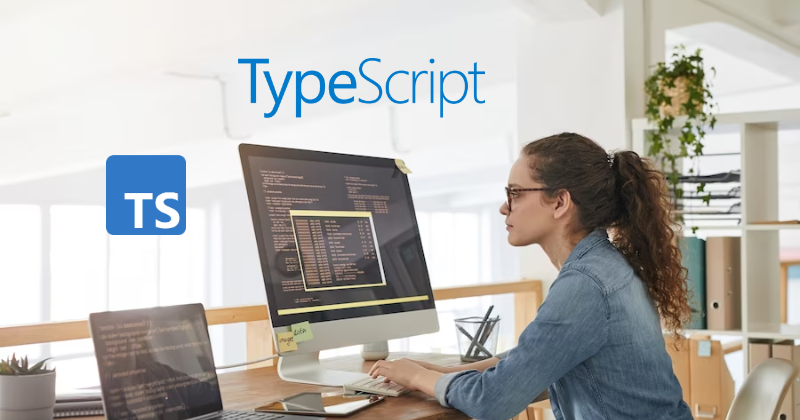
TypeScript is not a necessity in JavaScript development. However, it can be essential in;
- New developers learning JavaScript can use TypeScript to give structure to their code.
- Type safety makes it easy to maintain code and catch errors early.
- TypeScript is interoperable with JavaScript.
TypeScript libraries are a collection of pre-written code you can use in your project. On the other hand, runtimes are environments that allow TypeScript code to run outside a browser.
There exist different types of libraries designed to perform different functions. For instance, some libraries provide forms, others offer validation, and others provide access to external services such as APIs. These are some of the best TypeScript libraries and runtimes you can use;
Zod
Zod is a schema declaration and validation library. This library eliminates duplicative declarations and composes simple types into complex data structures.
Features
- Zero dependencies: You do not have to download any other packages to start using Zod. This feature makes this library portable and easy to install and get started.
- Lightweight: Zod library is just 8kb minified + zipped. Thus, it is the right library to create a fast application.
- Flexible: You can use Zod to validate various data types. You can also use this library for different validation approaches.
- Works with plain JavaScript: Zod is not only available for TypeScript, as you can use it with plain JavaScript.
Fastest Validator
Fastest Validator is a JavaScript and TypeScript validation library that can be used on modern browsers and runtimes like Deno and Node.js. This library has no dependencies and comes with over 20 built-in validators.

Features
- Blazing fast: Fastest Validator lives up to its name as it can run up to 8 million validations/second.
- Supports custom validators: You can add custom logic to your forms using this library.
- Supports strict object validation: With strict object validation, Fastest Validator ensures that an object will only contain properties defined in its schema.
- Customizable error messages: You can customize the error messages displayed by this library to suit your brand or preferences.
GoJS
GoJS is a web framework that allows developers to draw interactive diagrams on TypeScript and JavaScript. You can use this library to build interactive flowcharts, design tools, and draw organizational chats in visual languages.
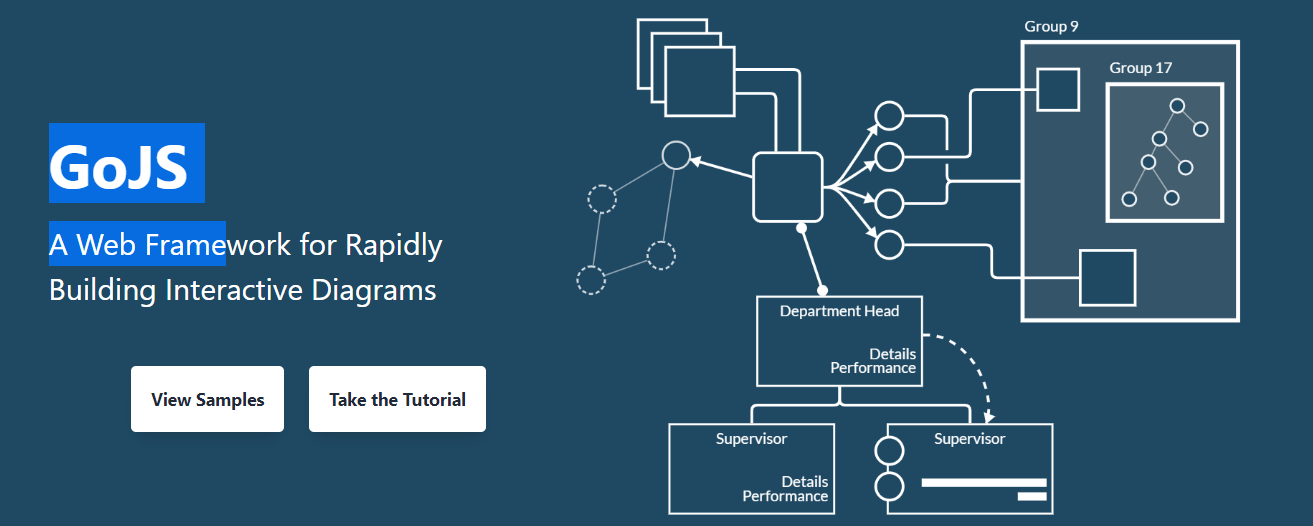
Features
- Multi support: GoJS runs on browsers and runtime environments like Node.js and Puppeteer.
- Automatic layouts: This library has various built-in layouts that you can select from and customize to suit your needs.
- Customizable Permissions and Events: You can execute custom notifications or logic when users perform certain actions.
- Extensible tools: GoJS has a collection of tools that you can use to extend its usability.
Type Fest
Type Fest is a collection of TypeScript types. You can copy-paste the types you need directly to your project or add them as a dependency.
Features
- Open-source: This collection is free and open-source. You can also contribute to the collection by adding new types.
- Many types to choose from: The number of types of the Type Fest platform is always rising. Some basic types are Primitive, Class, Constructor, AbstractClass, TypedArray, and ObservableLike.
- Cross-platform: You can use Type Fest on the browser or runtime environments like Node.js.
Jest
Jest is a testing framework for TypeScript and JavaScript projects. The framework is designed to help you write tests using a feature-rich and approachable API with quick results.
Features
- Easy to use: Jest comes as a Node.js package. After installation, you can create a jest.config.js file and use this testing framework.
- Fast and safe: Jest testing framework ensures that your tests have a unique global state, thus making it possible to run tests in parallel.
- Great API: Jest has a well-documented API that makes it easy to use and test projects using this framework.
- Awesome exceptions: Tests can fail in a TypeScript codebase. When they do, Jest provides a rich context explaining why.
TypeDoc
TypeDoc is a library you can use to generate documentation for TypeScript projects. This library converts comments in TypeScript code into a JSON model or rendered HTML documentation. TypeDoc is available as a Node module and also has a CLI version.
Features
- Easy to use: You can install TypeDoc as an NPM package, and it will then find an entry point to your project through the tsconfig.json file. You can also specify multiple entry points.
- Well documented: TypeDoc has detailed documentation to help you get started. It also comes with examples you can follow when generating docs for your TypeScript project.
- Usable with modern frameworks: You can use TypeDoc with libraries such as React with TypeScript as the base language.
Bun
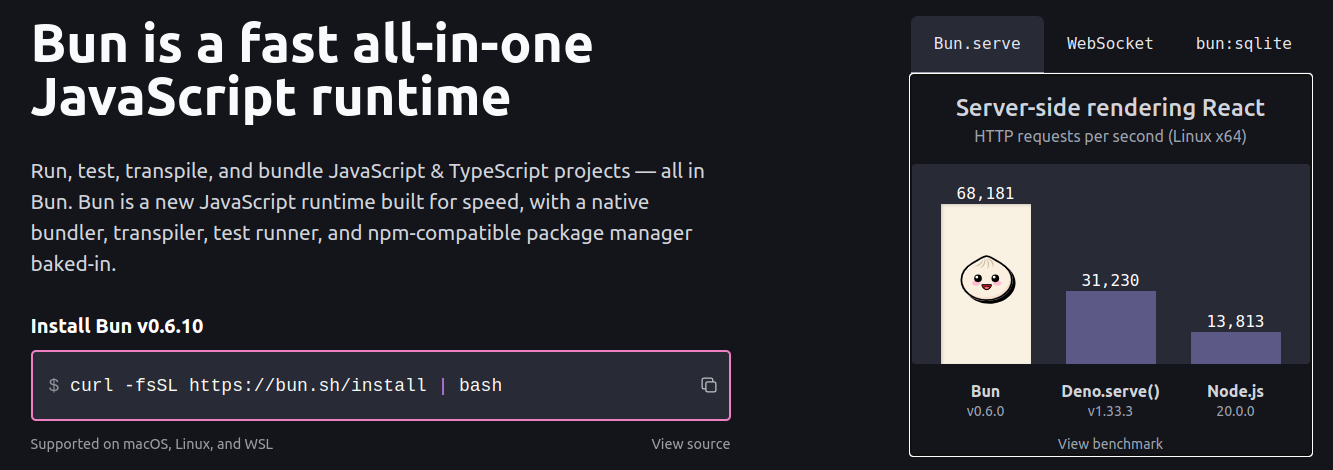
Bun is a fast TypeScript and JavaScript runtime. This runtime is supported on WSL, macOS, and Linux. This runtime environment offers a native bundler, a test runner, a package manager, and a transpiler.
Features
- Npm-compatible: Bun supports all npm packages through its baked-in package manager.
- Supports Node.js APIs: You can use Bun with web APIs such as ReadableStream, WebSocket, and Fetch.
- Written in ZIG: Bun is written in a low-level programming language called ZIG. This language is designed for speed.
Deno

Deno is TypeScript and JavaScript runtime. This platform has first-class support for TypeScript programming language, so you don’t have to spend hours on the configuration bit.
Features
- Great all-in-one tooling: Deno features several tooling tools like a code formatter, a built-in linter, a test-runner, and IDE integration.
- Hassle-free deployment: Deno allows you to run deployments with a single line of code and no server configuration. You can also host your TypeScript projects with programs of your liking.
- Built on Chrome’s V8 engine: You can take advantage of the fastness of this JavaScript engine.
- Allows permission checks: You can provide an allow list in your TypeScript project where Deno will access only specified files, environment variables, and network hosts.
Prettier
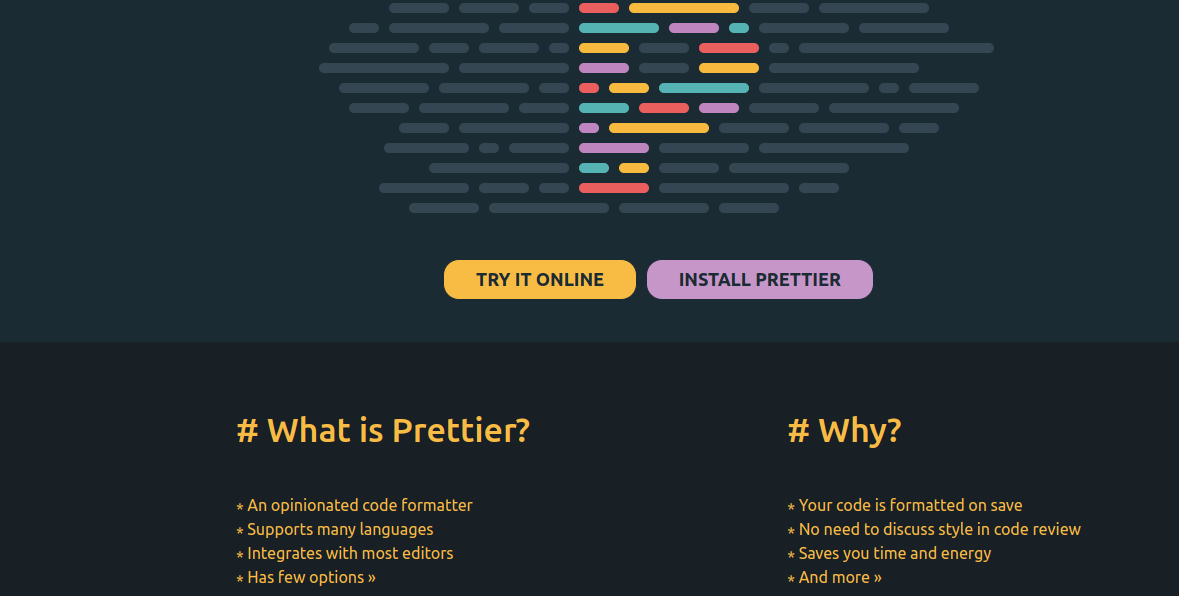
Prettier is an opinionated code formatter for TypeScript and other programming languages. Prettier is designed to save you time as it formats your code the moment you save it.
Features
- Easy to integrate with editors: You can integrate Prettier with code editors so your code is formatted as you write it. You can integrate it with Visual Studio Code, Vim, Emacs, and Sublime Text.
- Available online: You can use the online version to test or do quick prototypes.
- Compatible with various tools: You can use Prettier with JavaScript-based languages and libraries like TypeScript, Flow, JSON, and JSX. You can also use it with styling languages like CSS, SCSS, Less, and Styled-components.
Prisma

Prisma is a TypeScript and Node.js Object Relational Mapping, ORM. An ORM is a software layer between a database and an application. The ORM offers a way to map objects in the app to the tables in the database.
Features
- Comprehensive: Prisma is suitable for both SQL veterans and beginners with databases. The autocomplete feature makes it easy to use this ORM with little reference to the documentation.
- Hassle-free migrations: Enjoy auto-migrations from the Prisma Migrate from your Prisma schema. You get full control of these files as they are fully customizable.
- Supports collaboration: Prisma allows you to invite your team members and set permissions and levels of control.
- Visual database browser: Explore and visualize your tables using this browser. You can browse across tables, traverse relations, edit your data, paginate, and filter.
Phaser
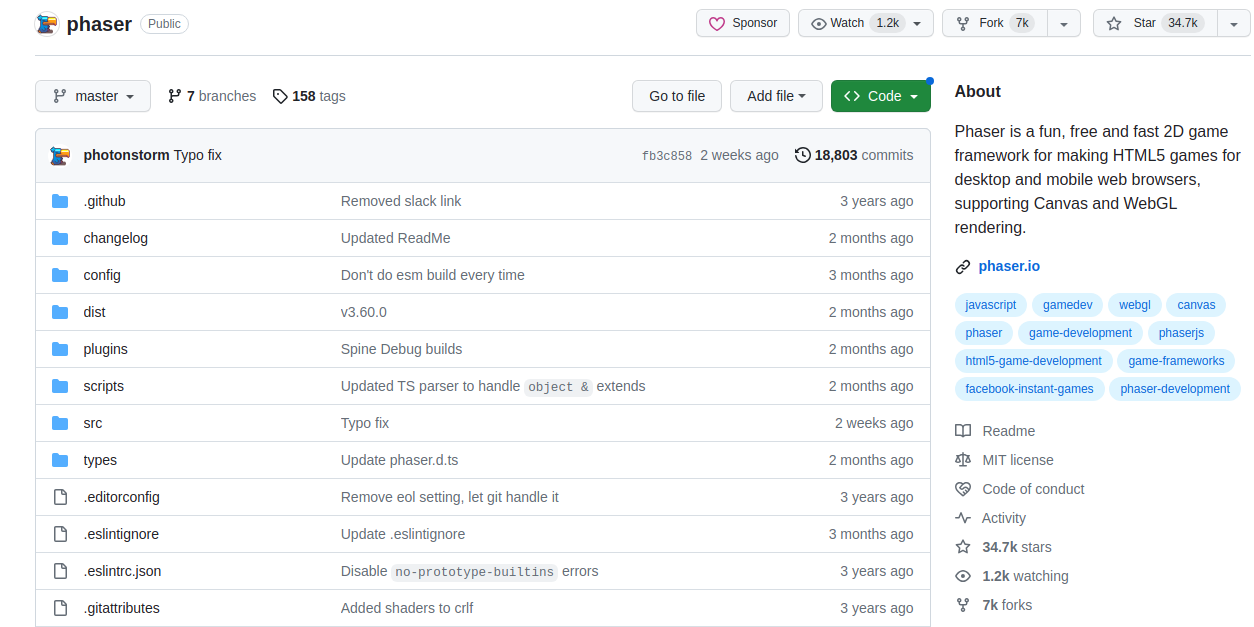
Phaser is a fast and free 2D game framework for building HTML5 games that can run on the web, mobile, and desktops. This fun framework supports WebGL and Canvas rendering.
Features
- Nine-Slice Game Object: With this, you can display a texture-based object stretchable vertically and horizontally but retaining fixed-size corners.
- WebGL and Canvas support: Phaser can switch between WebGL and Canvas renderers based on browser support.
- Plugin support: Phaser’s core is limited to essential classes, while a system of plugins handles the rest of the functions.
- Camera support: This library supports multi-camera. You can have extra cameras which are scalable for any screen.
Tiny-invariant
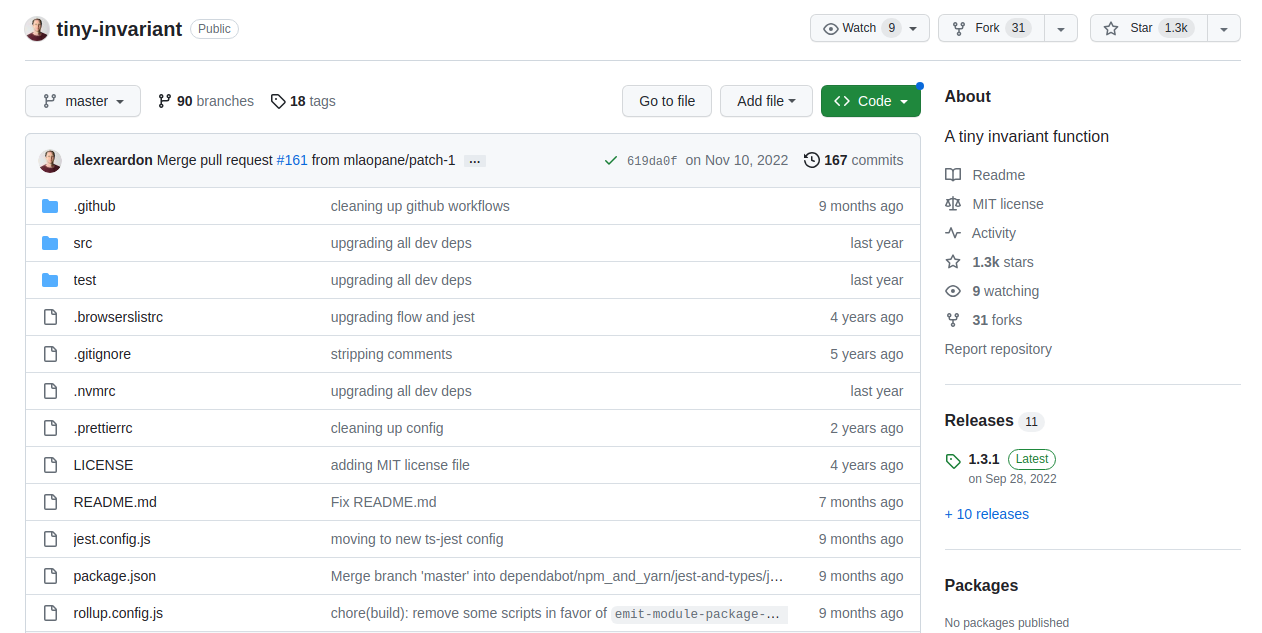
Tiny-invariant is a library that supports passing in arguments to the ‘invariant’ function in a sprintf style. An ‘invariant’ is a function that takes a value; if the value passed to the function is ‘truthy’, the function does not throw. However, the invariant function throws if the value is ‘falsy’.
Features
- Supports type narrowing: Tiny-invariant comes in handy in correctly narrowing types for TypeScript and flow.
- Small: This library does not have any dependencies. After installation, you can start using it right away.
- Supports different builds: You can use Tiny-invariant with CommonJS, EcmaScript module and universal module definition.
ESBuild
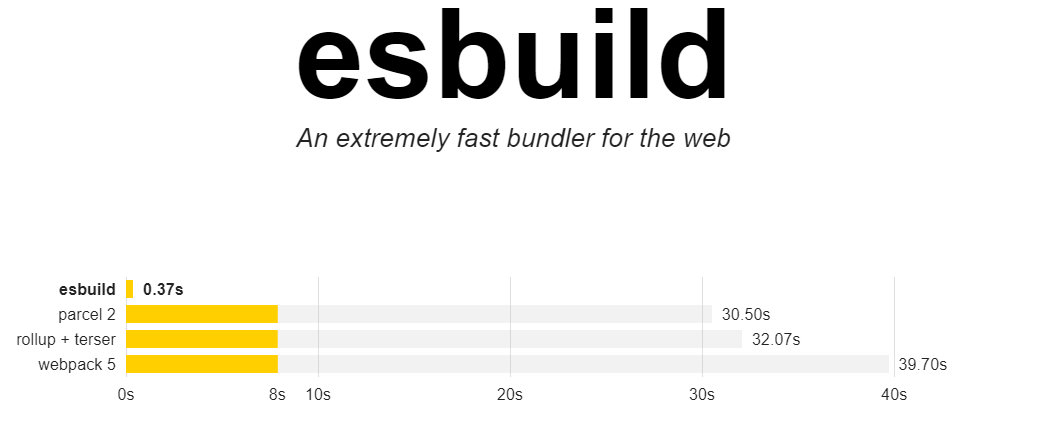
ESBuild is a fast bundler for TypeScript, JavaScript, JSX, and CSS. You can install this bundler on your local machine or try it directly on your browser.
Features
- Extremely fast: ESBuild is written in Go, a fast and compiled language. However, most other bundlers are written in JavaScript, which is not fast.
- Straightforward API: The most used ESBuild APIs are transform and build. These two APIs have extensive documentations that you can easily follow.
- Supports different content types: Besides this bundler having built-in support for the languages we have mentioned, it also supports JSON, Text, Binary, Base64, Data URL, External files, and Empty files.
- Extensible with plugins: You can inject code into parts of the build process using the plugins API. There exist different plugins designed for varying purposes.
The benefits of contributing to open-source TypeScript libraries
Most of the TypeScript libraries and runtimes we have discussed above are open-source. For a project to be referred to as open-source, the source code must be publicly available under an open-source license, allowing contributors.
These are some of the reasons why you can consider contributing to open-source projects;
- Build your portfolio: A good developer should have a collection of projects to present to interviewers. You can contribute to open-source projects to build such a portfolio.
- Connect with other developers: Open-source projects allow you to network and connect with developers worldwide.
- Give back to society: If your learning path is mostly based on open-source projects, you can give back by contributing to some.
- Gain experience: Open-source projects allow you to gain hands-on experience as you deal with real-world projects.
Conclusion
If you decide to use TypeScript in your next project, you now have various libraries and runtimes you can use. The library choice will depend on the nature of the project and your preferences.
We also have a JavaScript vs. TypeScript article that you can check out.


